| | | | | | | Presented By The ONE Campaign | | | | Axios World | | By Dave Lawler ·Nov 29, 2021 | | Welcome back to Axios World. - I had a lovely Thanksgiving break up in Massachusetts, spending time with family and tearing through "The Vote Collectors," co-authored by my Axios Charlotte colleague Michael Graff. It's a brilliant feat of writing and reporting on rural politics in the South.
- Hope you had a chance to unwind as well. Today's edition (1,709 words, 6½ minutes) takes off from the Solomon Islands.
New arrival? Subscribe. | | | | | | 1 big thing: Tug of war in the South Pacific | 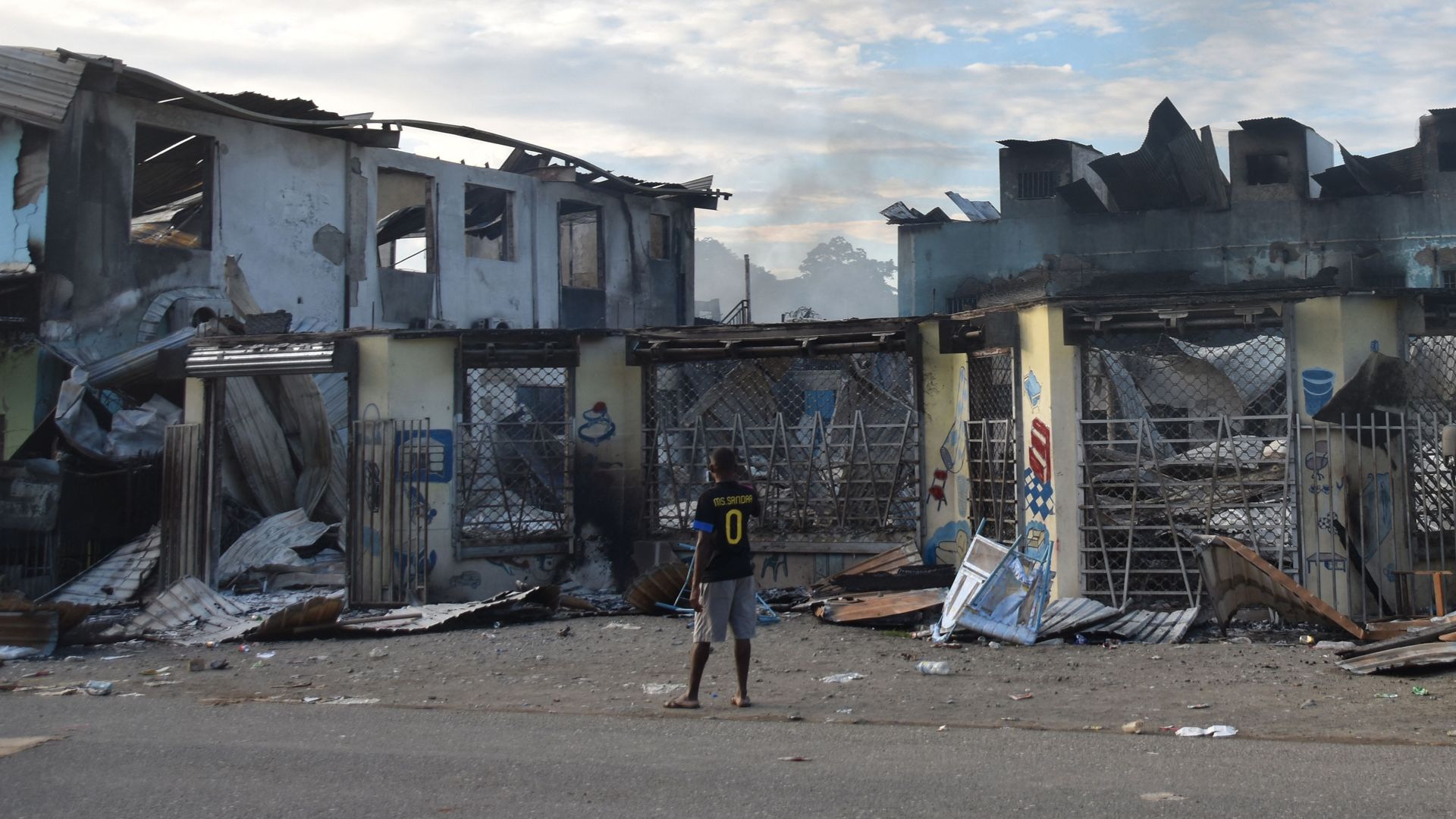 | | | Inspecting the damage. Photo: Charley Piringi/AFP via Getty | | | | Three days of rioting in the Solomon Islands may have been sparked by local grievances, but there's a clear geopolitical dimension at play and Prime Minister Manasseh Sogavare has accused unnamed "outside powers" of stoking the unrest. The big picture: The South Pacific island country rescinded diplomatic recognition of Taiwan in favor of China in 2019, leaving just 15 countries still recognizing Taiwan and generating domestic backlash against Sogavare. - The opposition was particularly intense on the country's most populous island, Malaita, where the provincial government defied the prime minister and maintained links with Taipei.
- The U.S. was accused of making a geopolitical play last year when it promised $35 million in aid directly to Malaita. Meanwhile, Sogavare has leaned into the relationship with Beijing, touting opportunities for Chinese investment.
- The diplomatic dispute has become another dimension of long-running tensions between the national government and Malaita over access to public resources and services.
Driving the news: Protesters from Malaita gathered last Wednesday in the national capital, Honiara, on the island of Guadalcanal, demanding that Sogavare meet with them and calling for his resignation. - The protesters attempted to storm parliament and were met with tear gas and rubber-coated bullets.
- That triggered three days of violence. Much of the looting and destruction came in Chinatown, and three charred bodies were recovered from a store there.
- Calm seemed to be restored by Saturday after Australia had dispatched 100 soldiers and police and Papua New Guinea sent 50 police officers, both at Sogavare's request. Australian Prime Minister Scott Morrison was careful to note that Australia was not taking sides.
State of play: Sogavare has rebuffed calls to resign and said the riots were due to "deliberate lies" about the diplomatic switch and meddling from "outside powers." That's probably a reference to the U.S. and Taiwan, writes Jonathan Pryke, director of the Lowy Institute's Pacific Islands Program. - China's party-run Global Times tabloid pointed the finger at both countries as well as Australia, despite the fact that Australian forces were invited in to keep the peace (the editorial cites speculation that Australia was wary of Chinese forces stepping in).
- Taiwan has denied any role in the uprising. The U.S. State Department expressed concerns about the violence and stressed the "enduring ties" between the U.S. and the Solomon Islands.
Reality check: "While geopolitics may have been a spark, the true drivers of this week's unrest go much deeper than foreign policy," Pryke contends. They include inter-island grievances, high youth unemployment and poor government services. |     | | | | | | 2. Iran preparing to enrich weapons-grade uranium, Israel warns U.S. | 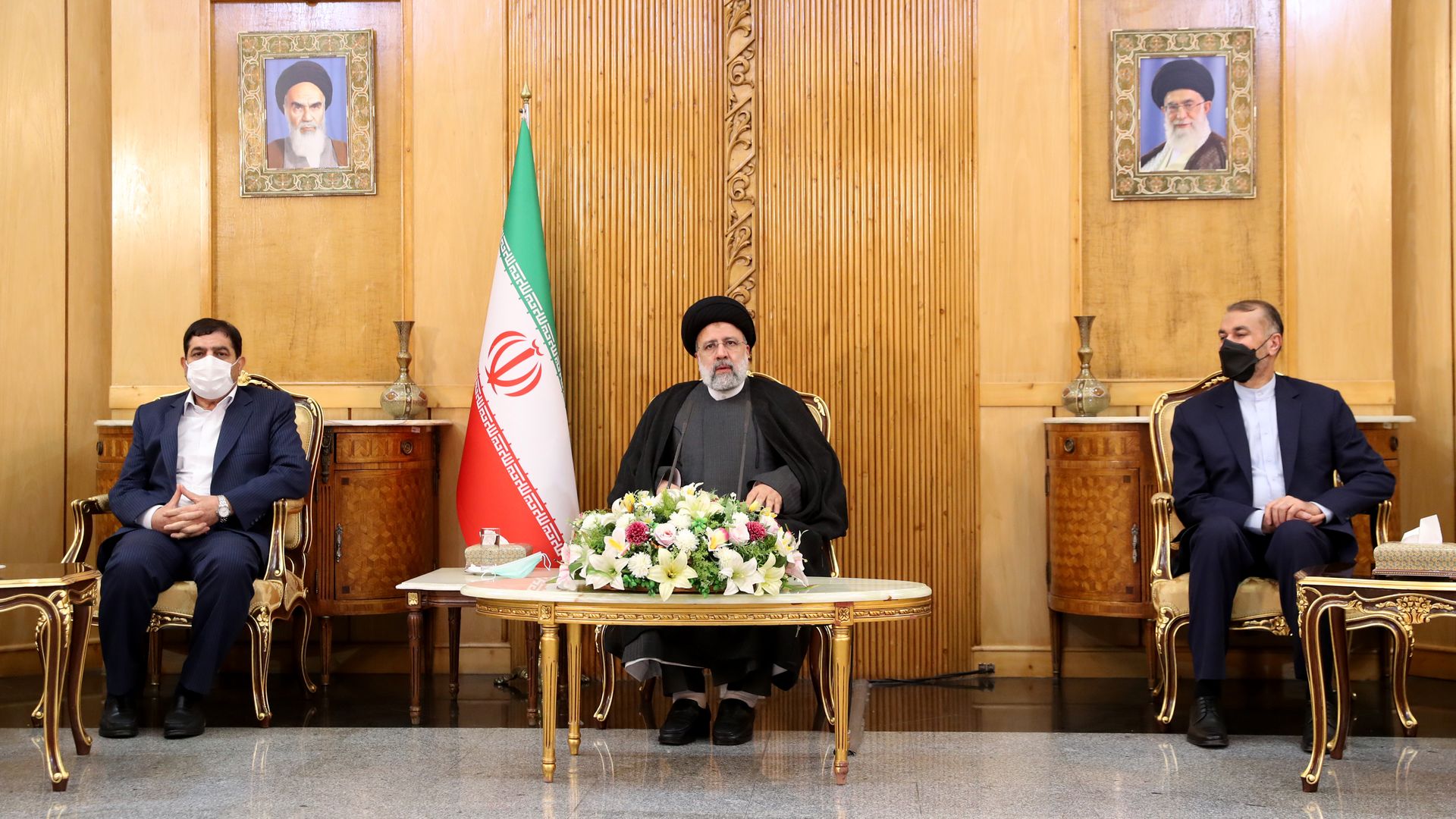 | | | Iranian President Ebrahim Raisi holds a press conference. Photo: Presidency of Iran handout via Getty | | | | Israel has shared intelligence over the past two weeks with the U.S. and several European allies suggesting that Iran is taking technical steps to prepare to enrich uranium to 90% purity — the level needed to produce a nuclear weapon, Axios' Barak Ravid scoops. Why it matters: Enriching to 90% would bring Iran closer than ever to the nuclear threshold. The Israeli warnings come as nuclear talks resume in Vienna, with Iran returning to the negotiating table today after a five-month hiatus. - The Iranians are negotiating directly with China, France, Germany, Russia, the U.K. and EU, and indirectly with the Americans.
What they're saying: Iran's hawkish new nuclear negotiator, Ali Bagheri Kani, wrote in the FT that a deal will only be possible if the U.S. is willing to "pay a price" for Trump's withdrawal, guarantee that it won't be repeated, and make the first move by removing all sanctions imposed since 2015. The Biden administration has said it will not meet those conditions. - The head of the EU delegation, Enrique Mora, expressed optimism about the first day of talks and said the new Iranian government had agreed to take the previous six rounds into consideration rather than starting from scratch, but that he doesn't expect any breakthrough this round.
What to watch: The intelligence Israel shared with the Biden administration suggests the Iranian preparatory steps would allow Iran to move ahead with 90% enrichment within weeks if it chose to do so, according to a U.S. source. Go deeper |     | | | | | | 3. State of the outbreak: The Omicron scramble | 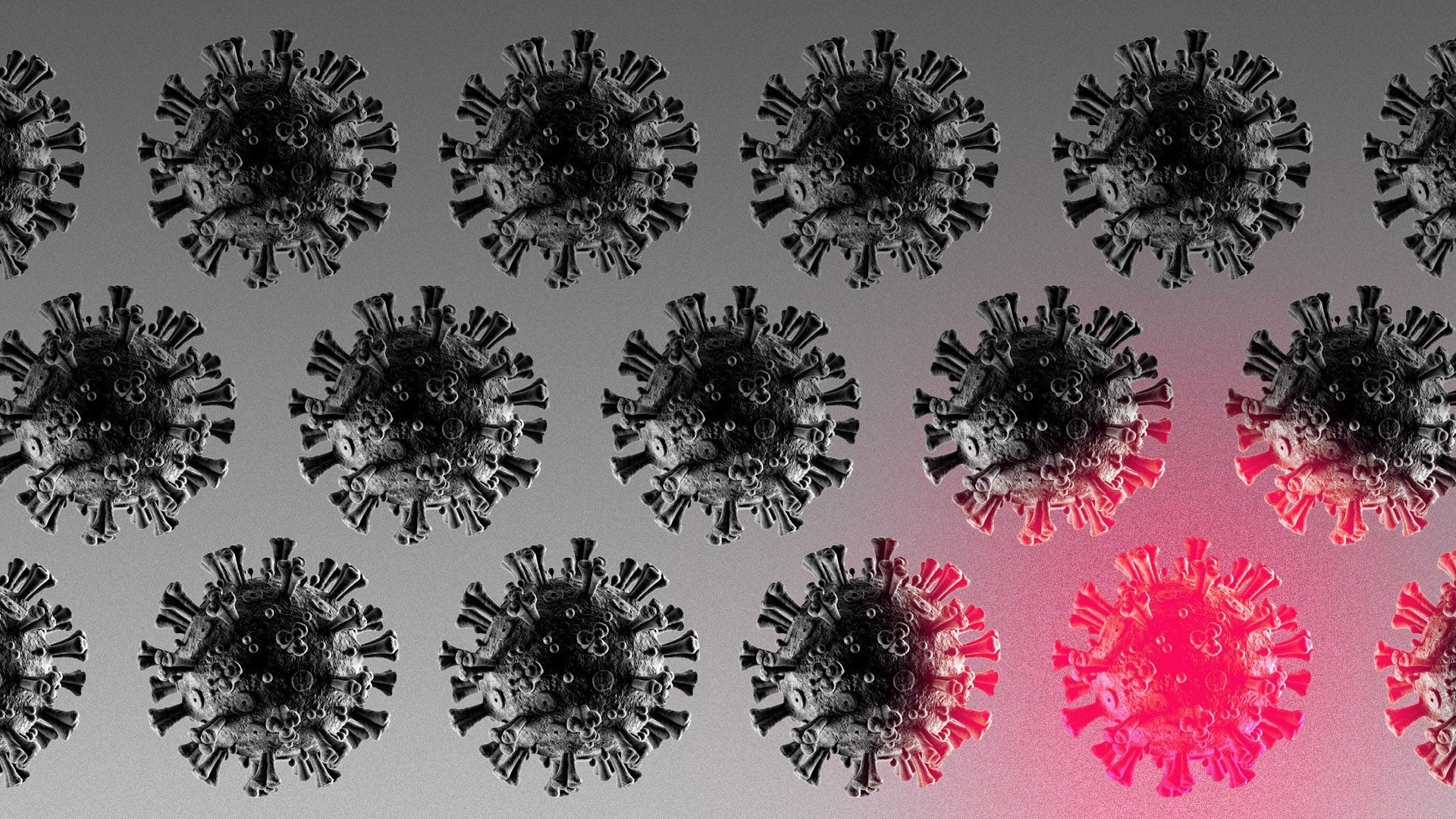 | | | Illustration: Sarah Grillo/Axios | | | | Countries are closing their borders and accelerating booster rollouts to stave off the danger from the Omicron variant. State of play: Omicron's mutations have scientists concerned that it could spread more easily than previous variants and render vaccines less effective, though it may not cause more serious illness. We won't have a clear picture for a couple of weeks either way, but countries aren't waiting to find out. - The U.K. expanded booster access to all adults from only people over 40. Countries including the UAE are taking similar steps. The CDC now says all Americans over 18 "should" get a booster.
- The U.S. is among the several countries that have banned flights from southern Africa (over objections from the WHO and the region). Japan and Israel are closing their borders entirely, while Australia froze plans to ease border restrictions. Countries that had been opening to tourists may now reconsider.
- The WHO says the threat from the new variant underscores the need to vaccinate the world. President Biden contended today that the U.S. is doing its part but "we need the rest of the world to step up."
Worth noting: Chinese President Xi Jinping announced today that China would be donating 600 million additional doses to Africa, and providing an additional 400 million through other means. |     | | | | | | A message from The ONE Campaign | | World AIDS Day 2021: AIDS is still a crisis | | | 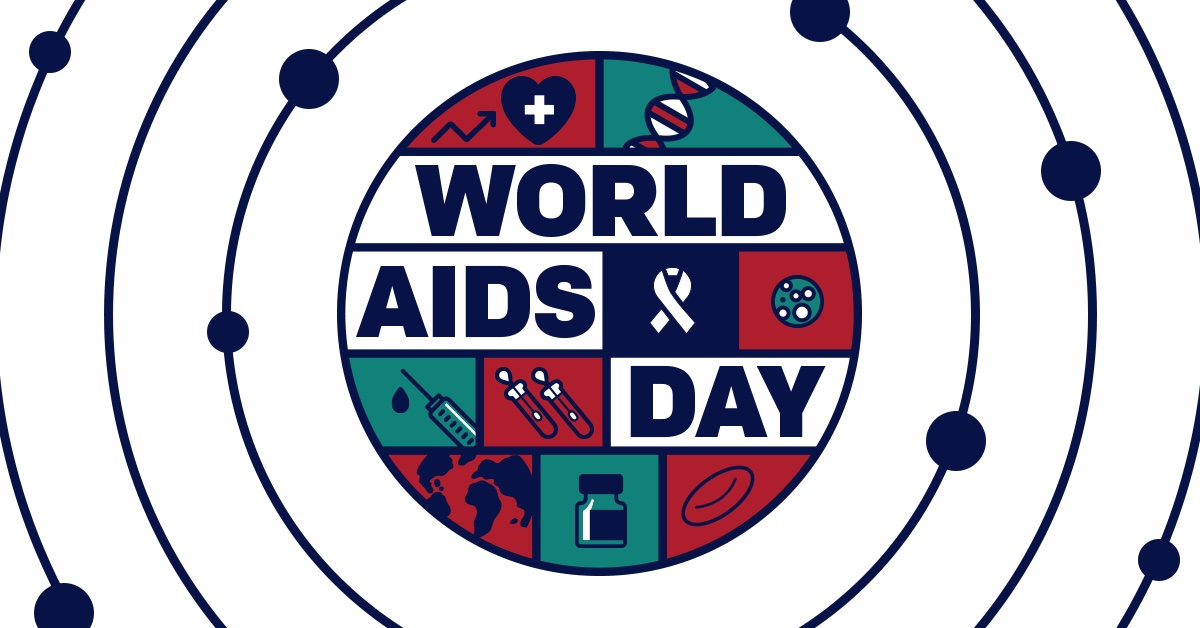 | | | | AIDS is not a disease of the past — it's a crisis now. Every day there are 4,000 new HIV infections, and in 2020 there were 680,000 AIDS-related deaths. This World AIDS Day, help us get the fight against AIDS back on track. Learn how you can help. | | | | | | Bonus: Where in the world? | 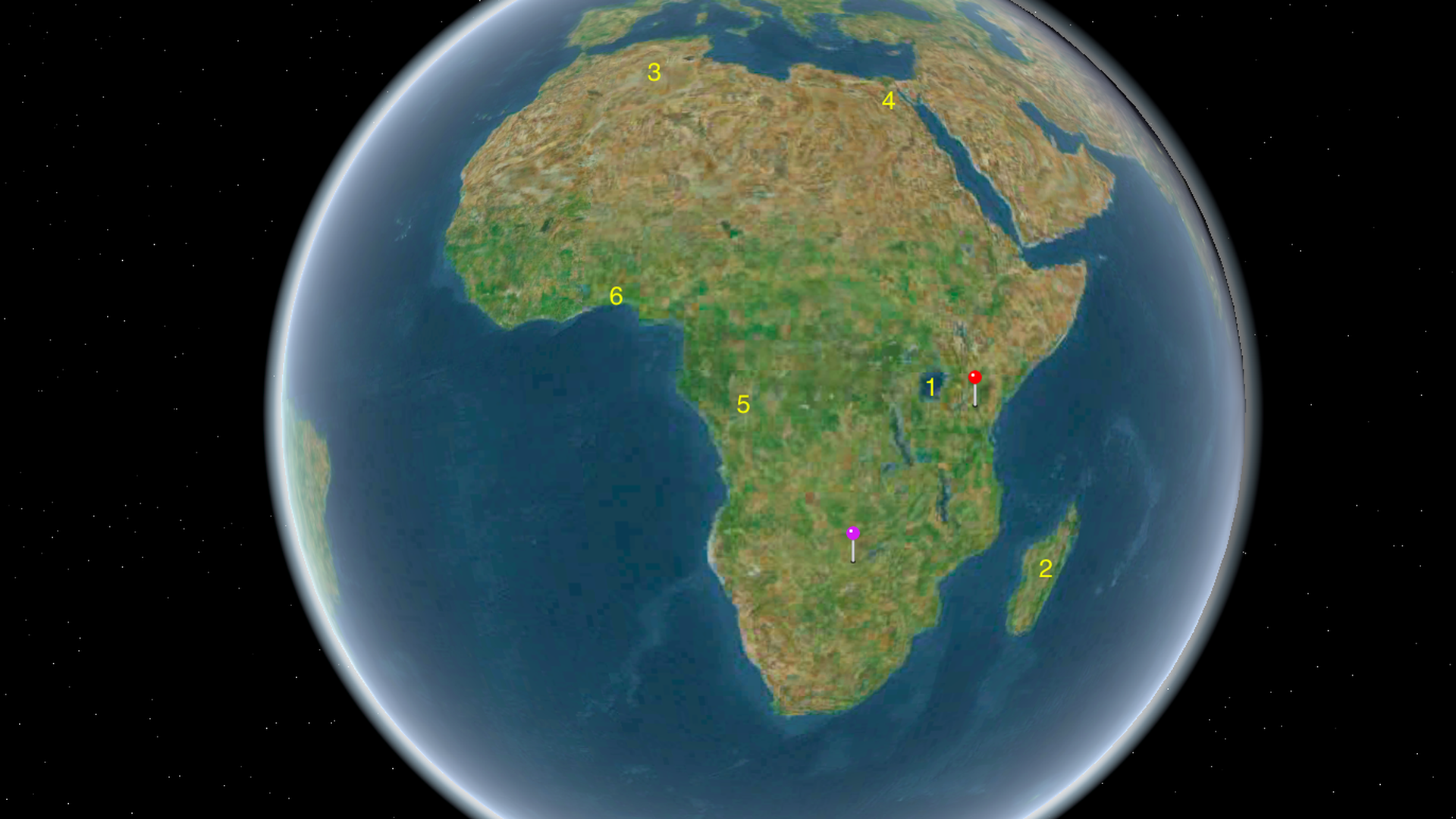 | | | Screengrab via Apple Maps | | | | Today we're searching for the biggest things in Africa. Can you name the... - Biggest lake by area (1)
- Biggest island (2)
- Biggest country by area (3)
- Biggest cities by population (4,5,6)
- Tallest waterfall (purple pin)
- Tallest mountain (red pin)
- Biggest desert (No number needed. It's huge).
Scroll to the bottom for the answer. |     | | | | | | 4. Kenya: Get the shot or lose public services |  | | | Registering for the shot, in Kajiado, Kenya. Photo: Patrick Meinhardt/AFP via Getty | | | | It's one of the strictest vaccination policies in the world, on paper at least: To access restaurants, many businesses, public buildings or government services like public transport, adults must be fully vaccinated by Dec. 21. The twist: The policy was announced in Kenya, where just 5% of the population and 9% of adults are fully vaccinated, due primarily to a lack of supply. State of play: With supplies increasing, the government has announced a major vaccination drive starting this week and hopes the mandate will help increase the uptake. There are obvious hurdles: - Even the government's most optimistic timetables would see vaccinations limited to around one-third of adults by the end of the year.
- Vaccine certifications are to be displayed via smartphone, which millions of Kenyans lack, Soila Kenya reports in The Continent.
- Kenyan security forces also used violent and at times deadly force to police previous pandemic policies like curfews, The Continent notes.
What to watch: Kenya's health minister has conceded that enforcement may be uneven. The big picture: Other African countries have attempted partial vaccine mandates, such as for government employees in Zimbabwe and for teachers and health workers in Uganda. |     | | | | | | 5. Germany claims pipeline sanctions would be "victory for Putin" | 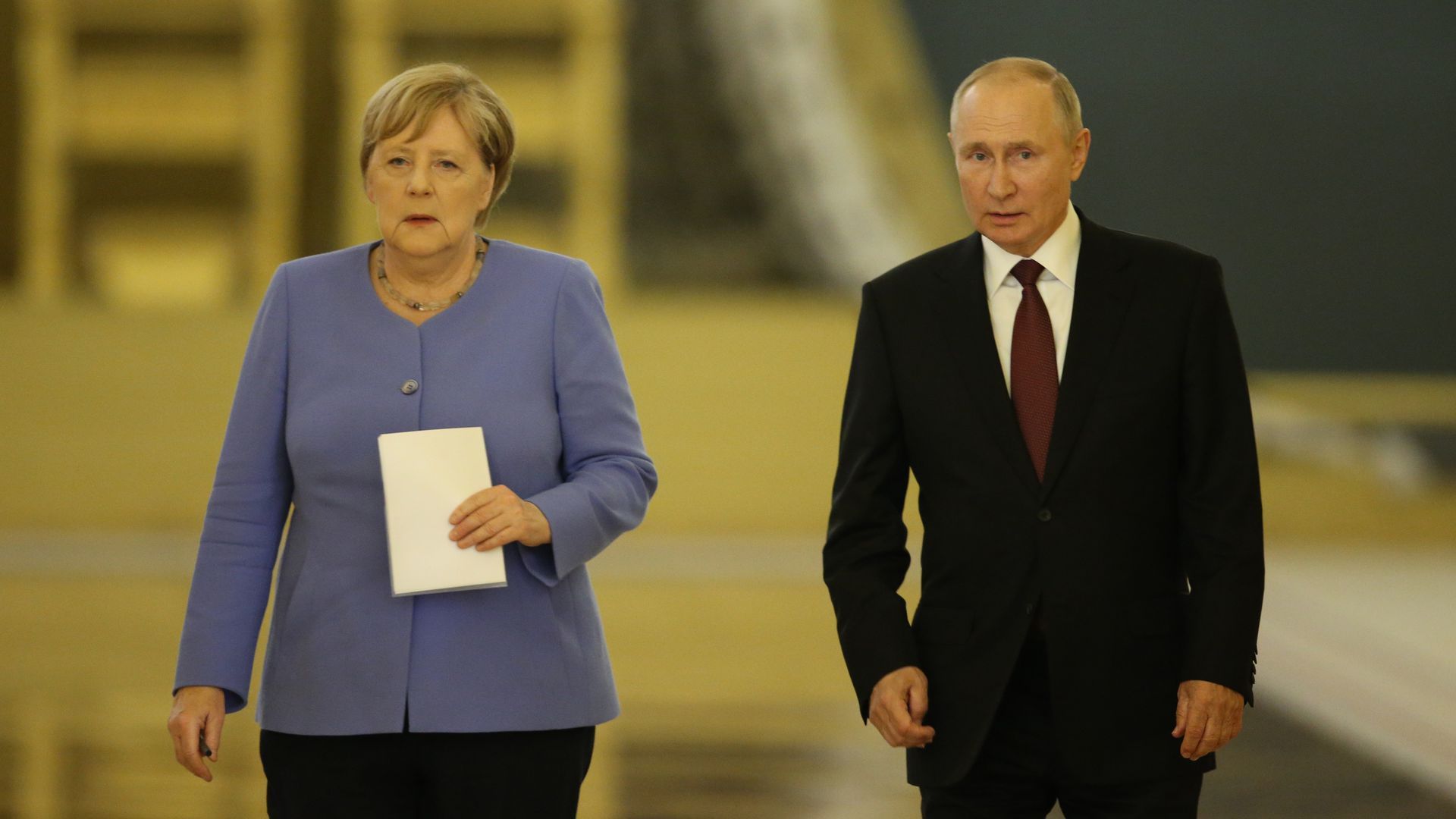 | | | Photo: Mikhail Svetlov/Getty Images | | | | The German government has urged members of Congress not to sanction the Nord Stream 2 pipeline, arguing that doing so will "weaken" U.S. credibility and "ultimately damage transatlantic unity," according to documents obtained by Axios' Zach Basu. Why it matters: The pipeline would circumvent Ukrainian transit infrastructure and deliver Russian gas directly to Germany, eliminating one of the last deterrents Ukraine has against an invasion. Context: President Biden says he opposes the pipeline, but he waived sanctions this spring in order to avoid alienating a key U.S. ally over a project that was already close to completion. - Dissatisfied Senate Republicans are now pushing for new sanctions as an amendment to the annual must-pass defense bill, with a vote possible as soon as this week.
Driving the news: In an attempt to reassure Congress, the German Embassy in Washington privately detailed what retaliatory action against Russia could look like in a "non-paper," which is typically used in closed discussions to convey candid policy positions. - A Nov. 19 document marked as "classified" outlines steps Germany would take at the national level, including "strong public messages" condemning Russia's behavior, "assessing" the suspension of future political meetings, and reviewing "possible" restrictions on future Russian fossil fuel projects — not including Nord Stream 2.
- The paper claims that Nord Stream 2 currently presents "no threat to Ukraine as long as reasonable gas transit is ensured," and it refers to potential sanctions on the pipeline as "a victory for Putin" because it would divide Western allies.
Go deeper |     | | | | | | 6. Global news roundup | 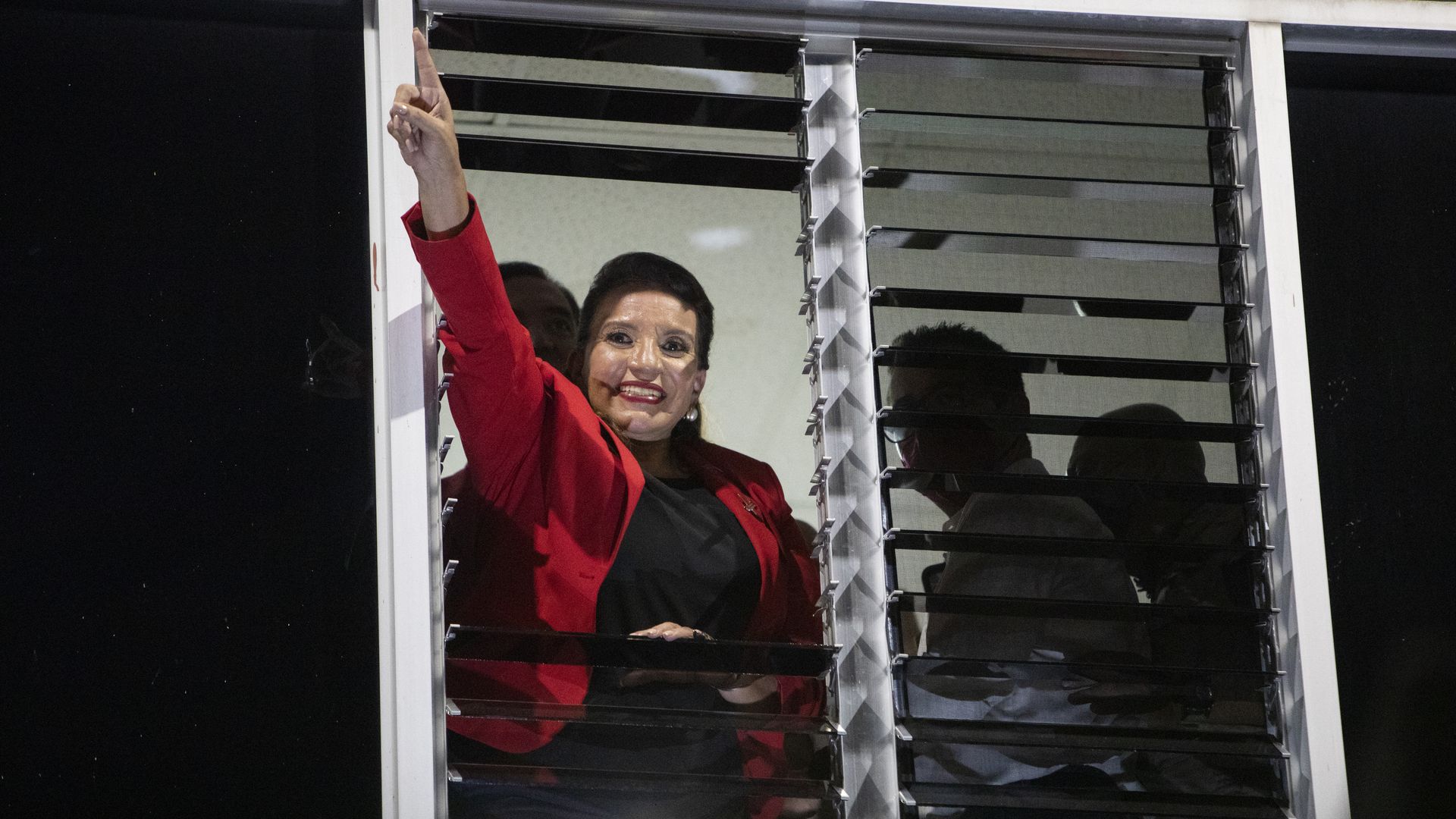 | | | Castro celebrates. Photo: Inti Ocon/Getty Images | | | | 1. Xiomara Castro appears to have won a landslide victory in Honduras' presidential election, putting her on course to become the country's first female president and first left-wing leader since her husband Manuel Zelaya was deposed in 2009. - What to watch: Castro has promised to reverse corruption and democratic backsliding. She could also break with Taiwan and establish diplomatic relations with China.
2. Magdalena Andersson was appointed as Sweden's first female prime minister, resigned, and then was appointed again today, all within the space of a few days. - The backstory: Andersson hoped to lead a coalition government but the Greens walked away when her budget failed to pass last week, prompting her resignation. The Social Democrat will now attempt to steer a minority government, implement the more conservative budget passed by Parliament, and hold things together until the next election in September 2022.
3. The government of the Democratic Republic of the Congo has announced an investigation into allegations, based on leaked bank records, that former President Joseph Kabila's friends and family siphoned around $138 million in public funds into private bank accounts. - The backstory: Kabila took office in 2001 following his father's assassination and has long been accused of using the office to enrich himself, which he denies. Since he stepped aside in 2019, the country's politics have hinged on Kabila's rivalry with President Felix Tshisekedi.
|     | | | | | | 7. Stories we're watching | 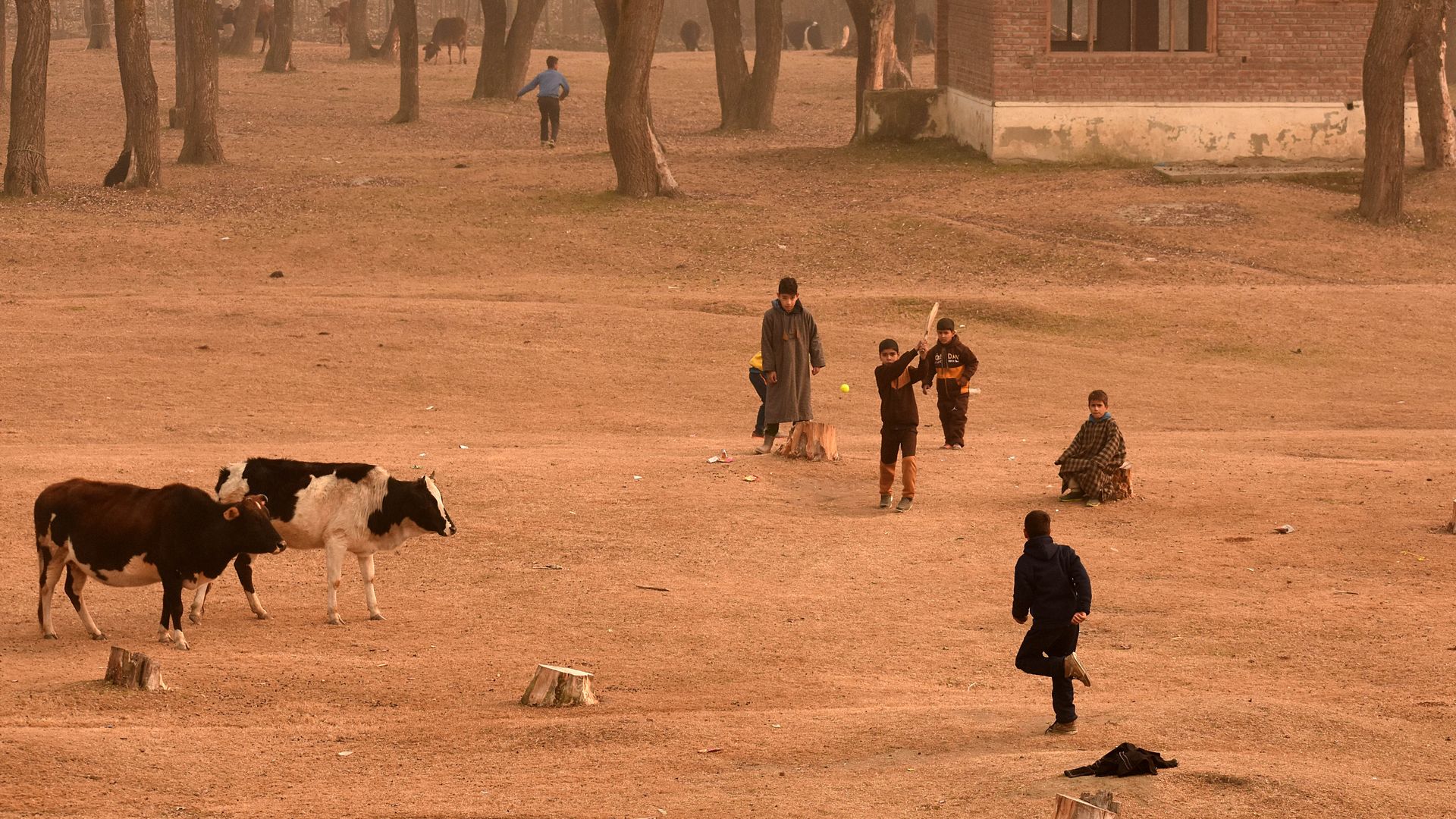 | | | Cricket in Kashmir. Photo: Faisal Khan/Anadolu Agency via Getty Images | | | - Biden restarting Trump's "Remain in Mexico" policy
- Chinese jets enter Taiwan zone
- Ukraine president claims coup plot
- Russian coal mine blast kills at least 52
- Esper sues Pentagon over book
- "Afghan girl" on 1985 Nat. Geo. cover evacuated to Italy
- Charted: The return of holiday travel
Quoted: "It's just been lovely and everyone is in really good spirits." — Nicola Townsend, general manager of a pub in Yorkshire, England, where guests have been stranded for three nights due to a snow storm but have spent the time watching films, decorating for Christmas, performing karaoke and listening to the Oasis cover band that's trapped along with them. |     | | | | | | A message from The ONE Campaign | | The global fight against HIV/AIDS is under threat | | | 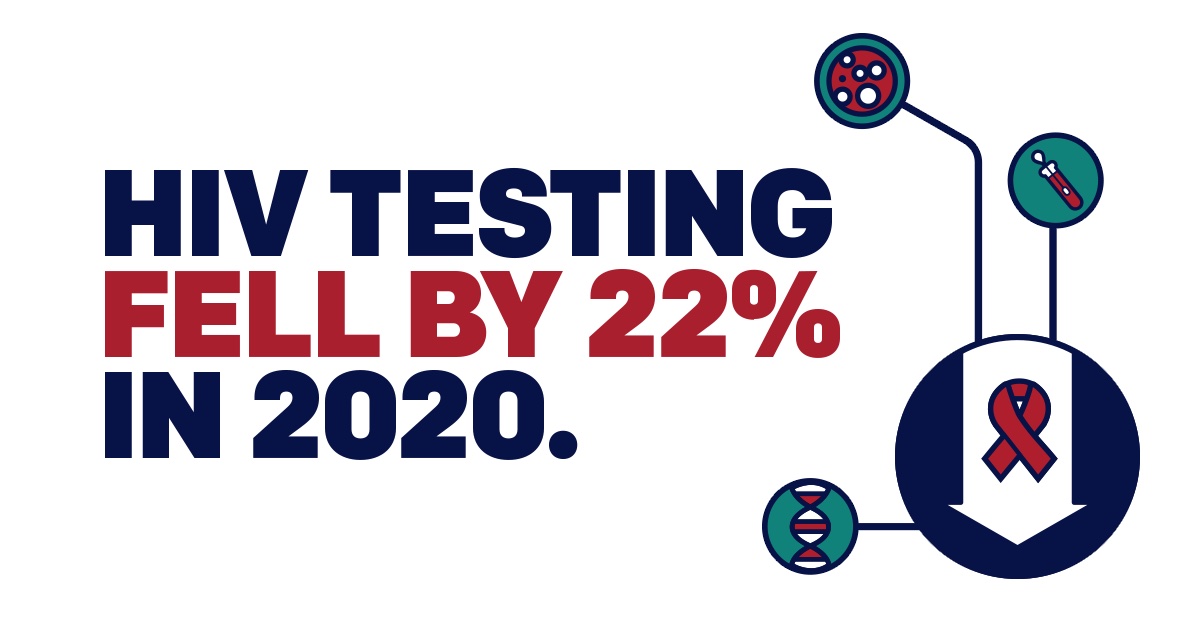 | | | | The pandemic has disrupted access to essential health services, threatening progress in the fight against AIDS. Worse yet, most people living with HIV/AIDS are in countries with limited access to COVID-19 vaccines. Take action. Sign our petition. | | | | Answers: Lake Victoria (1), Madagascar (2), Algeria (3), Cairo (4), Kinshasa (5), Lagos (6), Victoria Falls (purple pin), Mount Kilimanjaro (red pin), Sahara Desert. |  | | It'll help you deliver employee communications more effectively. | | | | | | Axios thanks our partners for supporting our newsletters. If you're interested in advertising, learn more here.
Sponsorship has no influence on editorial content. Axios, 3100 Clarendon Blvd, Suite 1300, Arlington VA 22201 | | | You received this email because you signed up for newsletters from Axios.
Change your preferences or unsubscribe here. | | | Was this email forwarded to you?
Sign up now to get Axios in your inbox. | | | | Follow Axios on social media:    | | | | | |
Post a Comment
0Comments